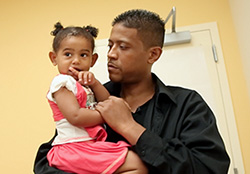

The Word on Hep C
The Fix: Documentary Raises Awareness of an Important Health Issue
Two years ago, Einstein's Division of Substance Abuse (DoSA) allowed something into one of their wellness centers that is not usually permitted: a video camera.
Behind that camera was independent filmmaker Laura Naylor, who had heard from a friend that there was a wellness center in the Bronx using storytelling in their Hepatitis C peer program.

Collette, one of the peer educators appearing in the film"It's a sensitive thing to bring a camera into any healthcare facility, a methadone clinic in particular," said Ms. Naylor.
After being permitted to sit in on a few storytelling workshops at Einstein's Port Morris Wellness Center in the South Bronx, she approached staffers and participants at the facility to see if they would let her film them. After careful consideration, the group agreed.
"We realized we had an opportunity to educate and bring awareness to Hepatitis C," said Dr. Sarah Church, executive director of DoSA. The disease currently afflicts more than 3 million Americans.
Empowerment through Storytelling
Over the course of a year, Ms. Naylor filmed the storytelling sessions that are part of Einstein's Hepatitis C peer educator program while also following the personal journeys of several peer educators. The result is The Fix, which won best documentary at the SOHO International Film Festival in May, and has since garnered other accolades.
"It sold out its first show at SOHO so quickly, it was selected for a second screening on the closing night of the festival," recalled Dr. Church.

Junior, who was featured in the film, reunited with another daughter, Iliana, after 10 years"The theme of the movie, and our theme in the division, is empowerment," said Irene Soloway, a physician assistant who has been treating hepatitis C for the past 14 years at DoSA and is featured in the film. "It's a film about recovery, community and treatment. It's about patients engaged as agents of change in their own health and in the lives of others."
The documentary closely follows three of Port Morris' peer educators. Each has had a history of drug abuse, is treating his or her Hepatitis C and has gone through at DoSA's Hepatitis C Program to educate others about treatment. The trio is introduced in the film as "individuals on the front lines of helping to educate and eradicate Hepatitis C from their communities."
Among these peer educators is Collette Roche. "Telling my story of abuse and recovery to a camera was merely an extension of what I do with the peer group at Port Morris," she said.
In the film, she talks about her past, and how becoming a certified Hepatitis C peer educator was her way of helping to fight the stigma and misunderstandings of the disease. "It's a way of trying to make up for a lot of stuff; a lot of wrong choices."
The group changed her life.
"I grew as a person, emotionally and mentally because of my experiences in the group," she said in a recent interview at the wellness center.
Making the film wasn't always easy, she confided. "Sometimes it was a little intense, the camera on you, waiting for that reaction."
Changing Lives
For DoSA staff members, the difficulty was having cameras in their facility, where confidentiality and privacy are so important. But members of the peer group wanted to share their stories to help others. "We realized that the film offered our team—staff and peer educators—an opportunity to help change more lives," noted Dr. Church.
 "It seems like a natural progression from the advocacy within the group. It's another way to advocate," she added. "And it can help us to educate people about recent advances in Hepatitis C treatment."
"It seems like a natural progression from the advocacy within the group. It's another way to advocate," she added. "And it can help us to educate people about recent advances in Hepatitis C treatment."
Over the course of the filming, Hepatitis C treatment changed dramatically, with new therapies that had fewer side effects becoming available. And the treatment is still evolving and improving. "By the end of 2014, we expect treatment to require only one pill per day, with close to 100 percent efficacy," said Dr. Church.
Hometown Screening
DoSA is helping to organize the Bronx premiere of the film, which will include a panel of experts discussing advances in treatment.
"We want to get the word out in the community that treatment has changed. There's a lot of hope," said Ms. Soloway.
Ms. Roche agreed. "I hope people will realize that having Hepatitis C isn't the end of the world and that it's important to be tested and to get treatment," she said. "The longer you wait, the harder it's going to be. Get tested, get treatment."
"My hope is that it will have a great impact on raising awareness," added Ms. Naylor.
For the film's participants, its impact already extends beyond Hepatitis C. Junior, another of the peer educators, shared how he was reunited with a daughter he hadn't seen in 10 years. During a "Q & A" session following a screening in Washington, DC, a man in his 60s thanked Junior for telling his story. "I'm also an absentee father and you've given me the inspiration to try to make amends with my children," he said.
"For me, that's more meaningful than a fabulous film review from a critic," summed up Ms. Naylor.
Posted on: Monday, August 25, 2014


